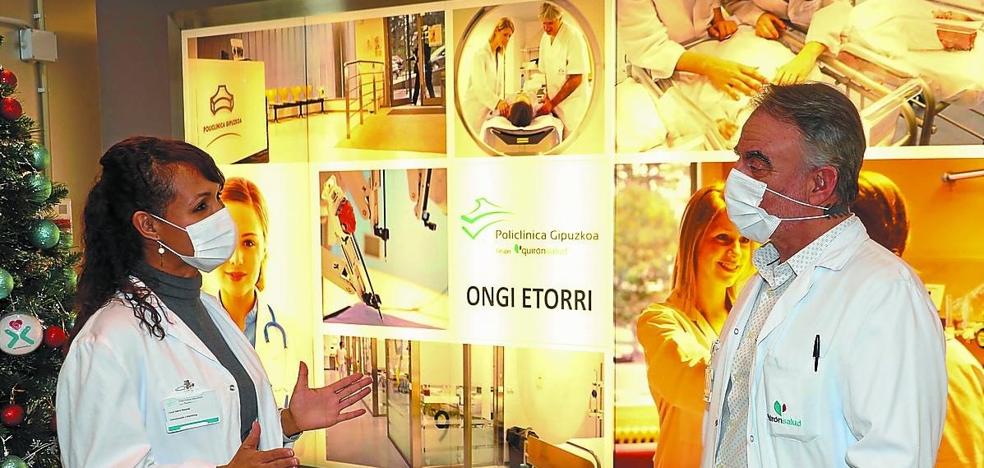
It has been the monotheme of 2020. The Covid-19 has been the protagonist in our conversations since March and the Health Classroom organized by Policlínica Guipúzcoa if you ask today what exactly we know about this disease. Sonia Roussel, medical-care director of Policlínica Gipuzkoa and Quirónsalud Gipuzkoa, will moderate a colloquium in which Dr. Idania de los Santos, pulmonologist at Policlínica Gipuzkoa, and Iñaki Ayesa, head of the Emergency Service at the San Sebastian center, will take part. The appointment is at 7pm at the Aquarium.
-Is society well informed about Covid? Has the message moved well?
Dra. Idania de los Santos: At least in the first half of the pandemic the message was ambiguous and confusing, I think it is the result of ignorance of something completely new. What was thought at first was completely different from what happened afterwards and this generated uncertainty in the population. But today much of the population handles information about the magnitude of the pandemic, its negative effect with a big goal to our lifestyle, health and economy.
Dr. Iñaki Ayesa: On the one hand I think that there is over-information, almost overwhelming, from which we cannot escape and on the other hand there is a lack of depth in some analyzes. But we are well enough informed and the one who does not realize the gravity of the situation is because he does not want to.
-What have I learned about medicine about this disease?
IS: That we will probably never know everything. It is a virus that has tested us all. Every time we study we don’t realize that the more we don’t know about him. It is a virus with a different behavior. Every patient has always been a world away, but with this virus even more so. There are young people with no previous illnesses, who can go to the ICU and even fail and there are others of older age and with multiple pathologies who will come to my consultation on foot and without complications, although it is clear that this it is not the most common.
AI: Medicine has learned a lot and in a short time, from the identification of the virus and its structure in the early days, to vaccines already on the way.
-What treatments have proven to be effective today?
IS: No treatment has shown absolute effectiveness, although today we know that anti-inflammatory therapy with corticosteroids better in some cases the survival of severe cases. Support with oxygen and in severe cases with ventilation will give us a time for which the patient recovers the situation of respiratory failure. Today we also manage complications that appear in these patients as thrombotic phenomena and on infections better than at the beginning of the pandemic.
-Are the treatments indicated today very different from those indicated in March?
IS: Yes. In the first months, hydroxychloroquine and lopinavir / ritonavir were widely used, and it was later shown that these drugs would be used in the viral phase of the disease without showing any benefit.
-How should the symptoms be for emergencies and not choose to pass the disease home?
AI: Shortness of breath or a high fever that lasts could also be, but my recommendation is to make a telephone medical consultation. Depending on the age and the presence or absence of previous illnesses, a face-to-face assessment may be necessary. Keep in mind that at some point you will have to travel to perform a diagnostic test.
-Should someone who has already passed the Covid-19 follow some kind of control?
IS: Depending on the severity with which it has manifested, medical checks will be performed because today we do not know if patients will be left with sequelae or in what percentage. In any case, he is optimistic about this and I think it will be exceptional for patients with severe long-term sequelae.
-Which test are most effective?
IS: The test that has shown since the beginning of the pandemic that is most effective is the determination of PCR in nasopharyngeal smears.
-Are self-diagnostic tests feasible?
AI: Proponents are right to expand diagnostic capacity, but also detractors of the possibility that positive outcomes that are mandatory isolation escape the control of health services: a patient on discovering positive may not communicate .
ID: In general, I consider that the more tests that are done, the better, but self-diagnoses have the disadvantage that the person who tests positive may not communicate.
-Can a person get a test without a doctor’s prescription?
AI: You can request the test without a prescription and in fact you are doing professional reasons, travel, etc. Usually through private laboratories, and usually by appointment.
-Is it recommended to have a test before Christmas being healthy?
IS: I don’t see it necessary. Information can be handled. What would you do if the result is a false negative? That is, what will I do to a person with or without symptoms who is positively negative on the test? Can you go out and live a life without restrictions? I think that if people are passed on the idea of getting tested while being healthy it would be ‘crazy’: first because there is no time right now to make prescriptions for anything they want and second because those who are negative believe they can stay with friends and family in complete peace of mind.
AI: It is more advisable to limit contacts. A negative test can also give a false sense of security.
-What are the most effective precautionary measures?
IS: The reality is that we have not overcome the pandemic and the virus is transmitted when people come together, so this Christmas we must spend with our circle of coexistence.
IA: I don’t think we’re going to be able to avoid a third wave if we don’t convince ourselves that we shouldn’t celebrate this Christmas as if nothing happened.